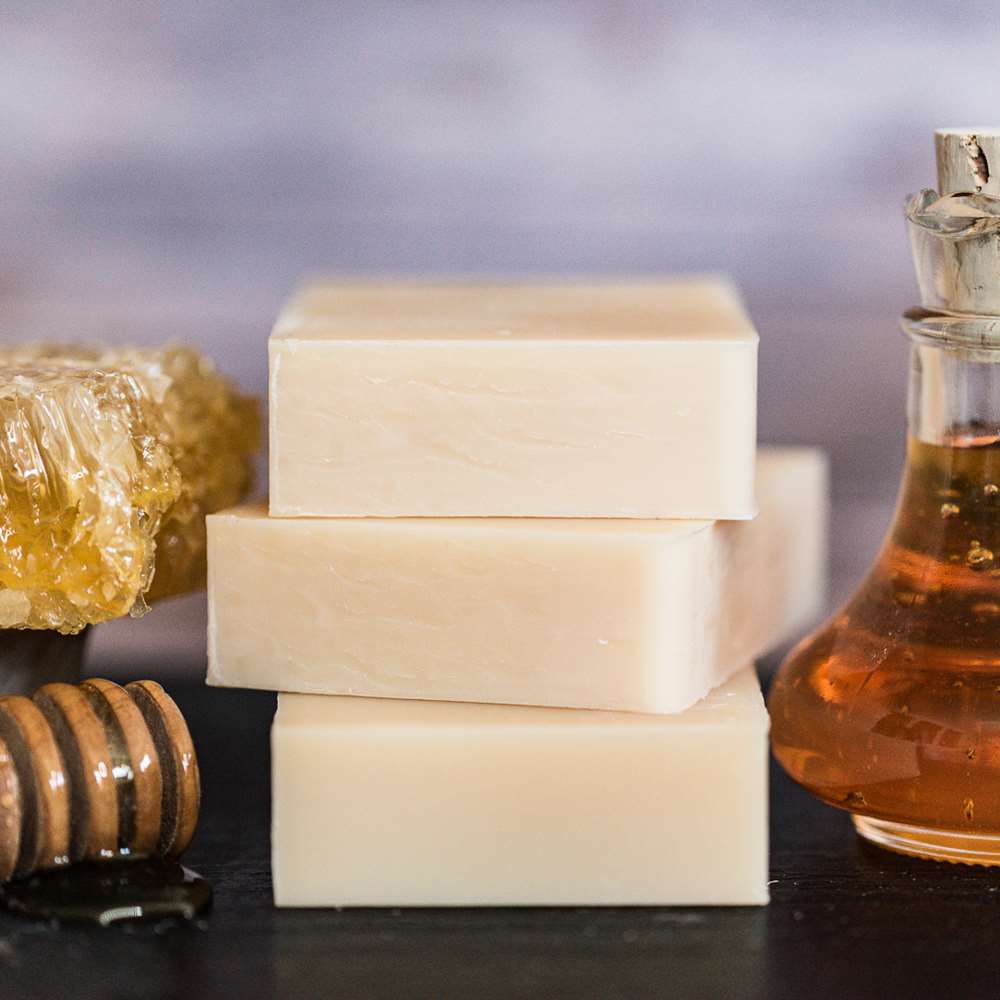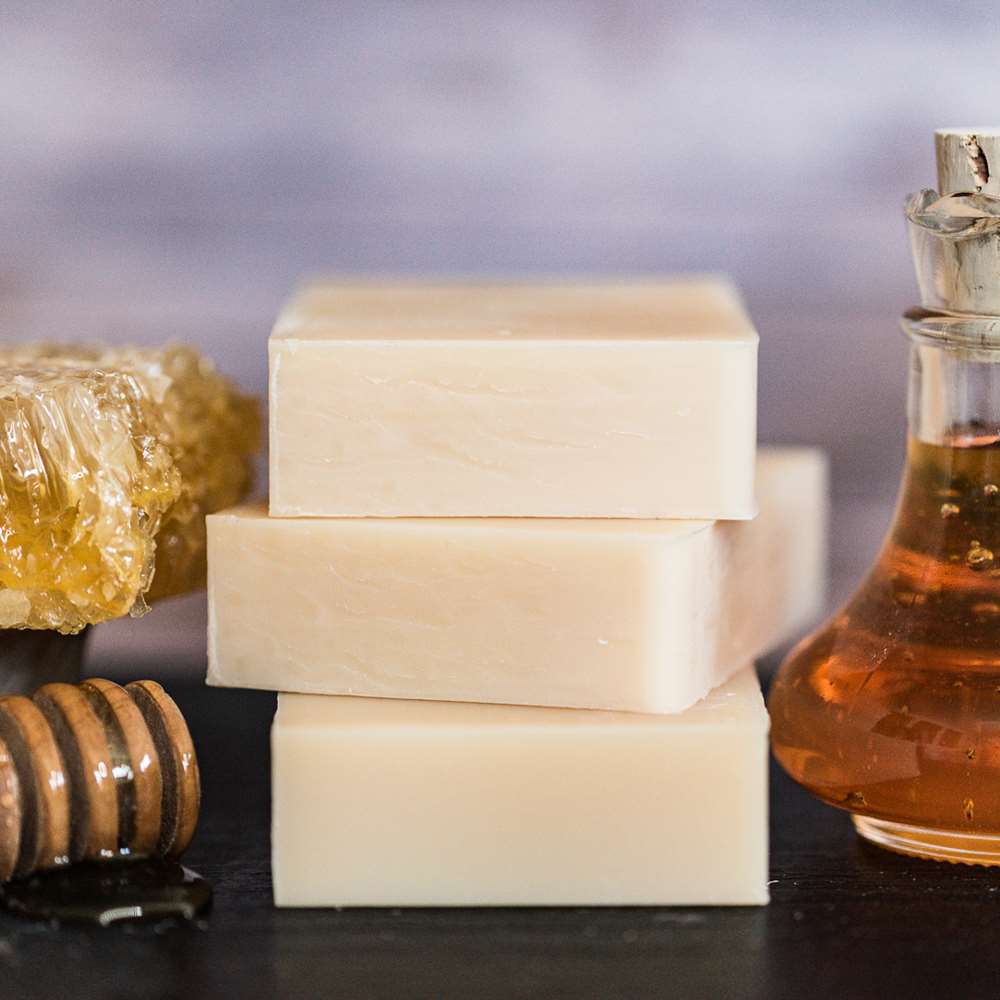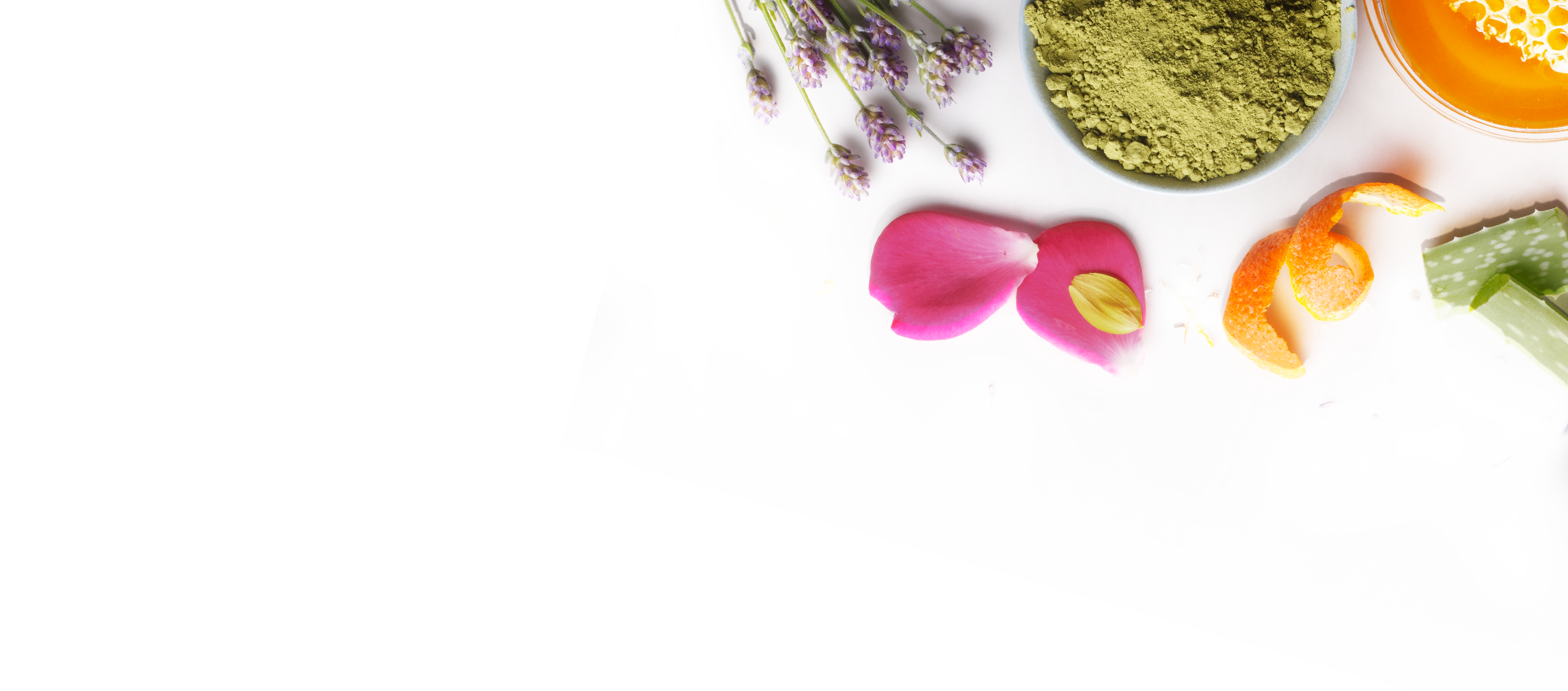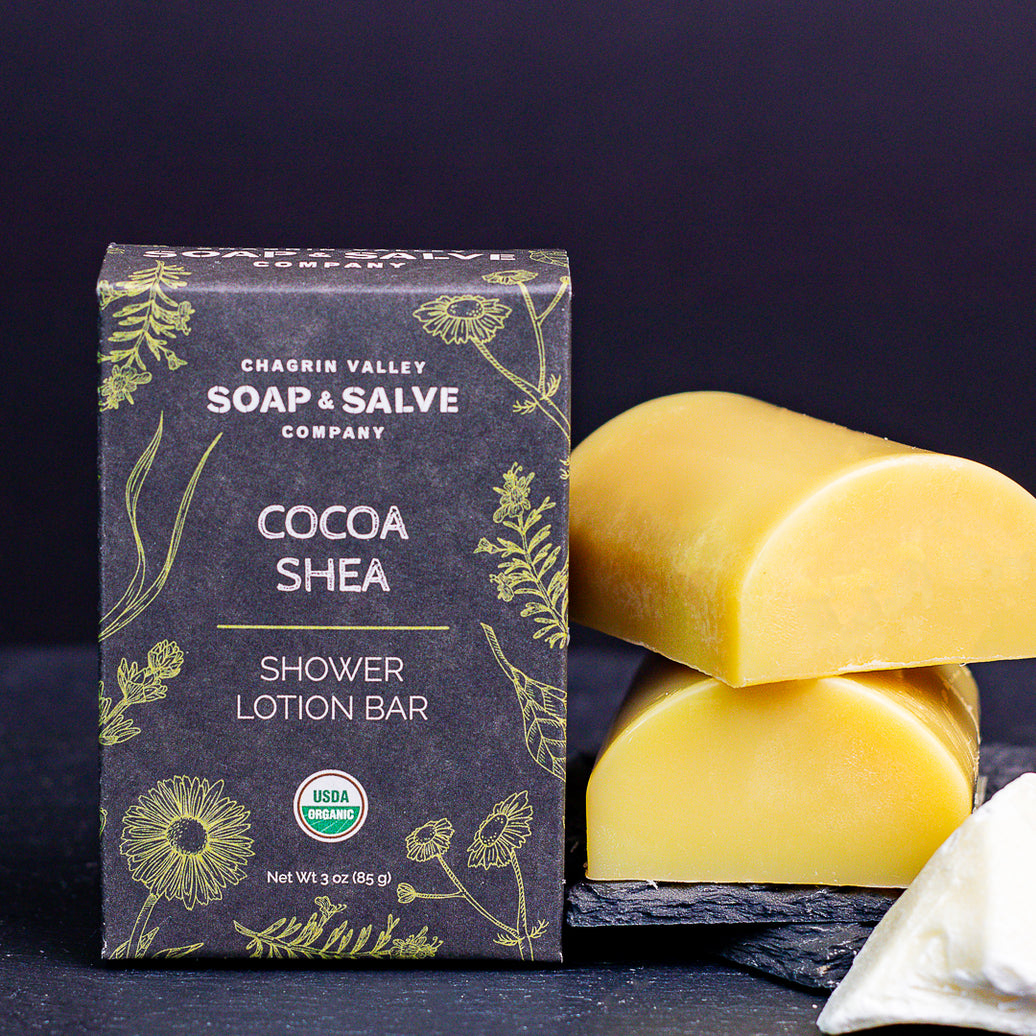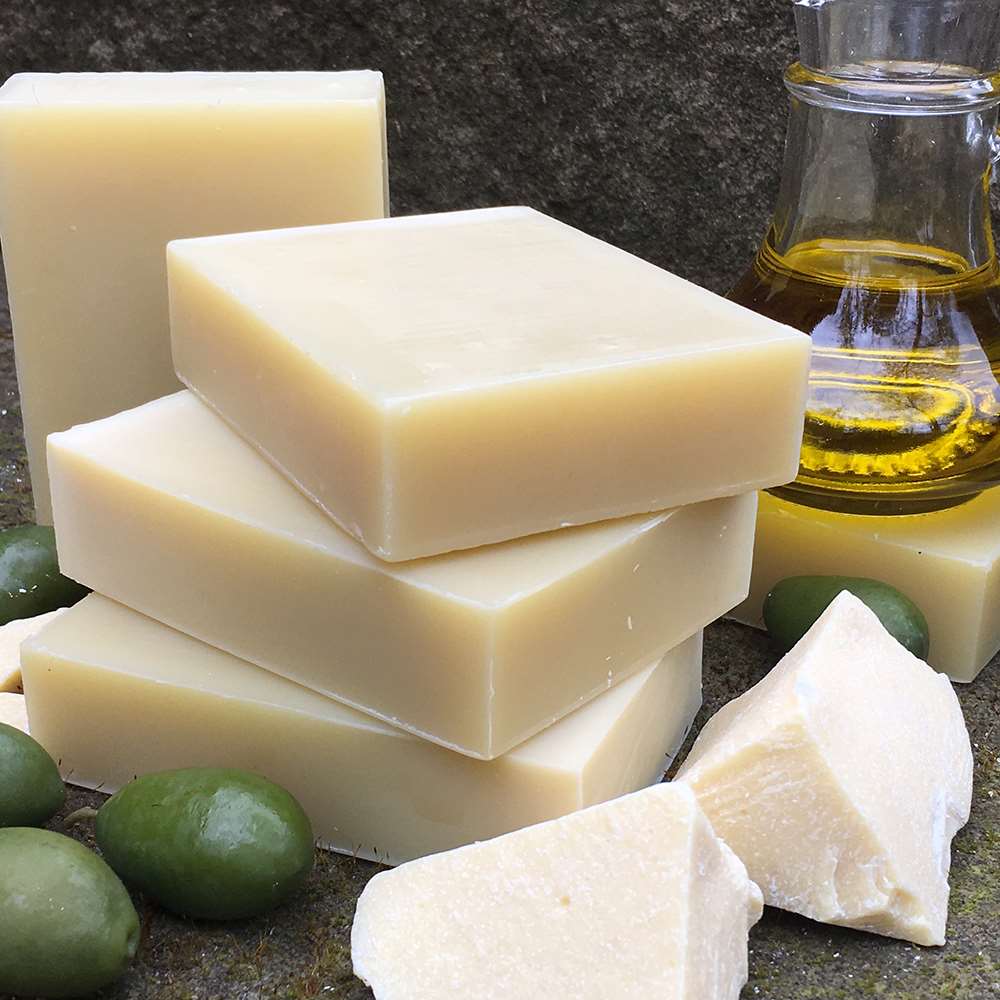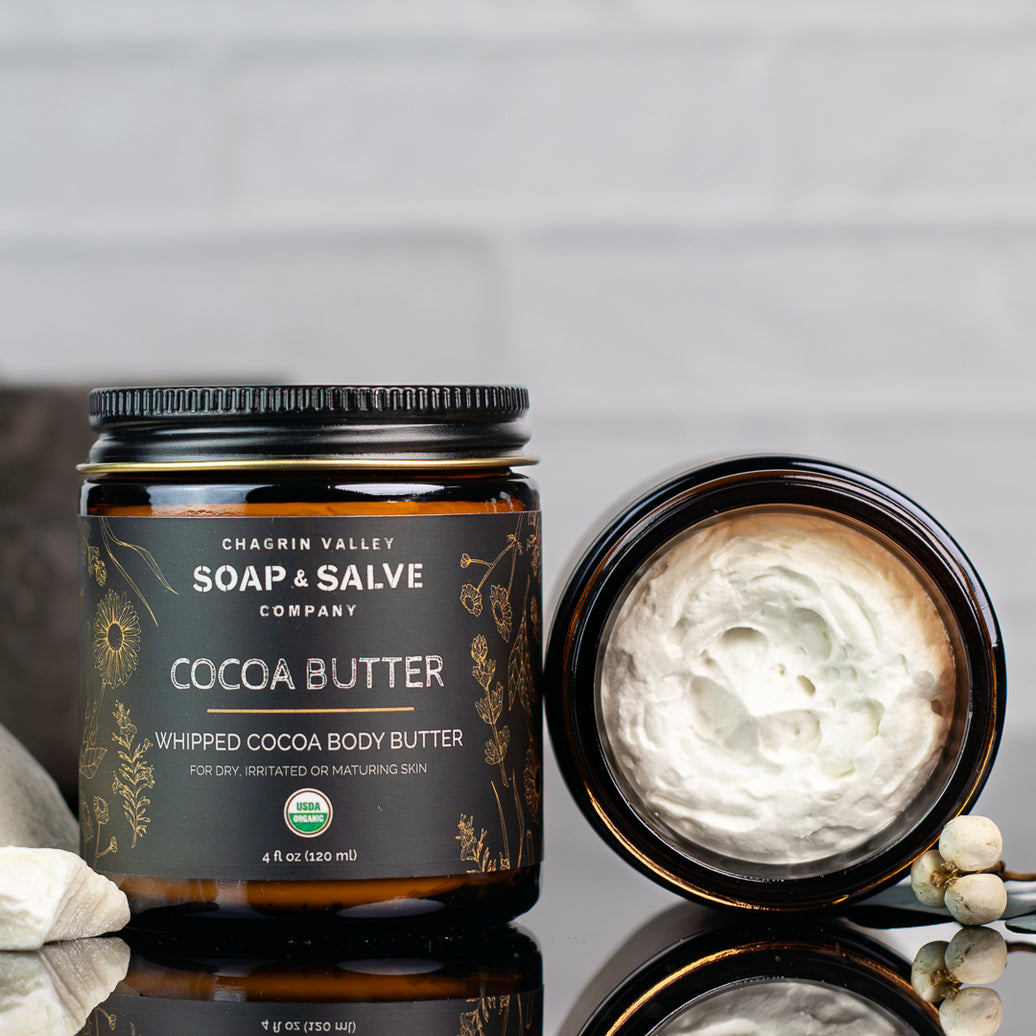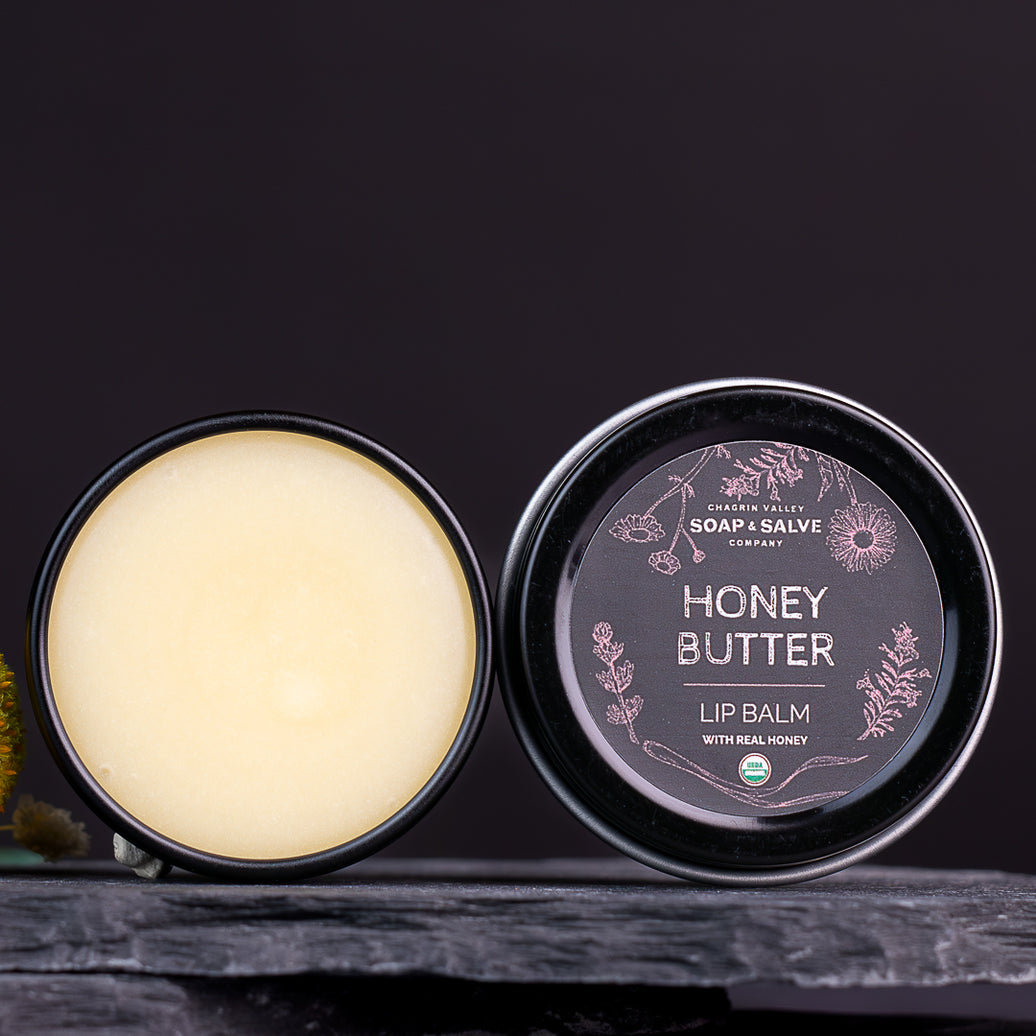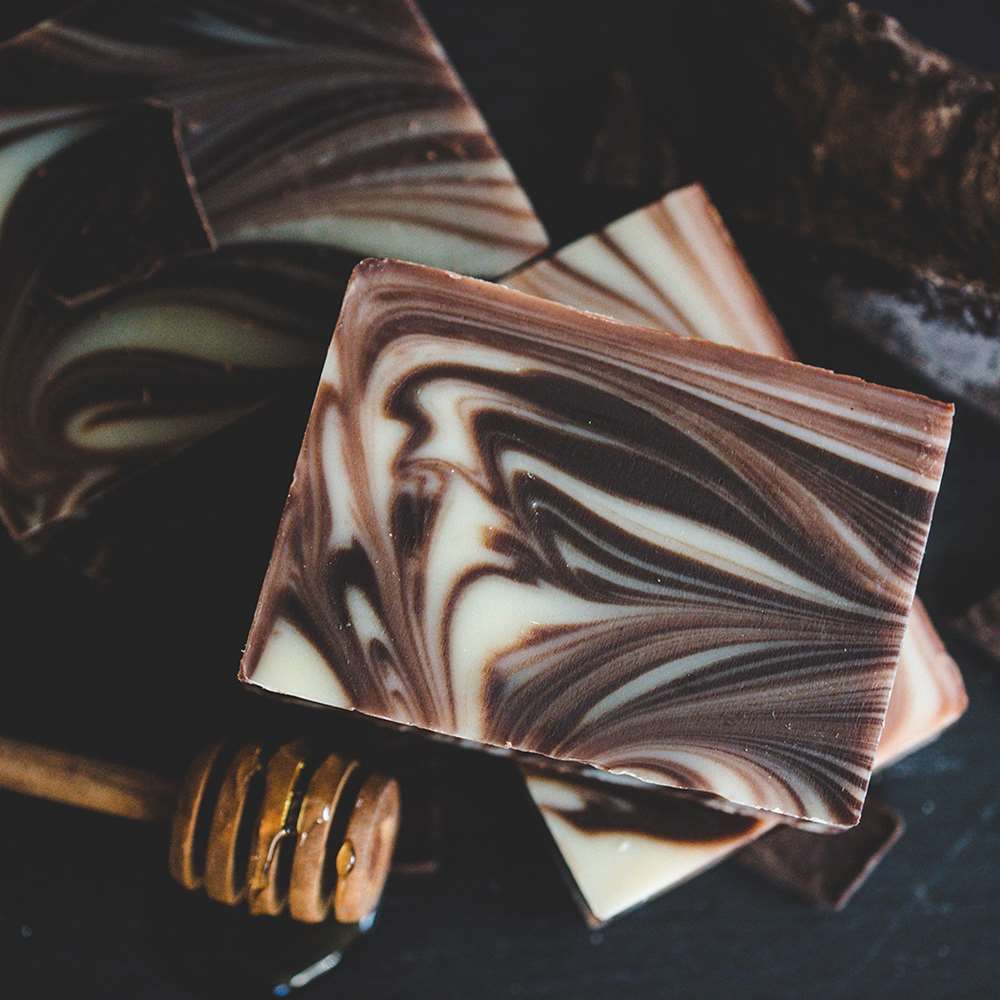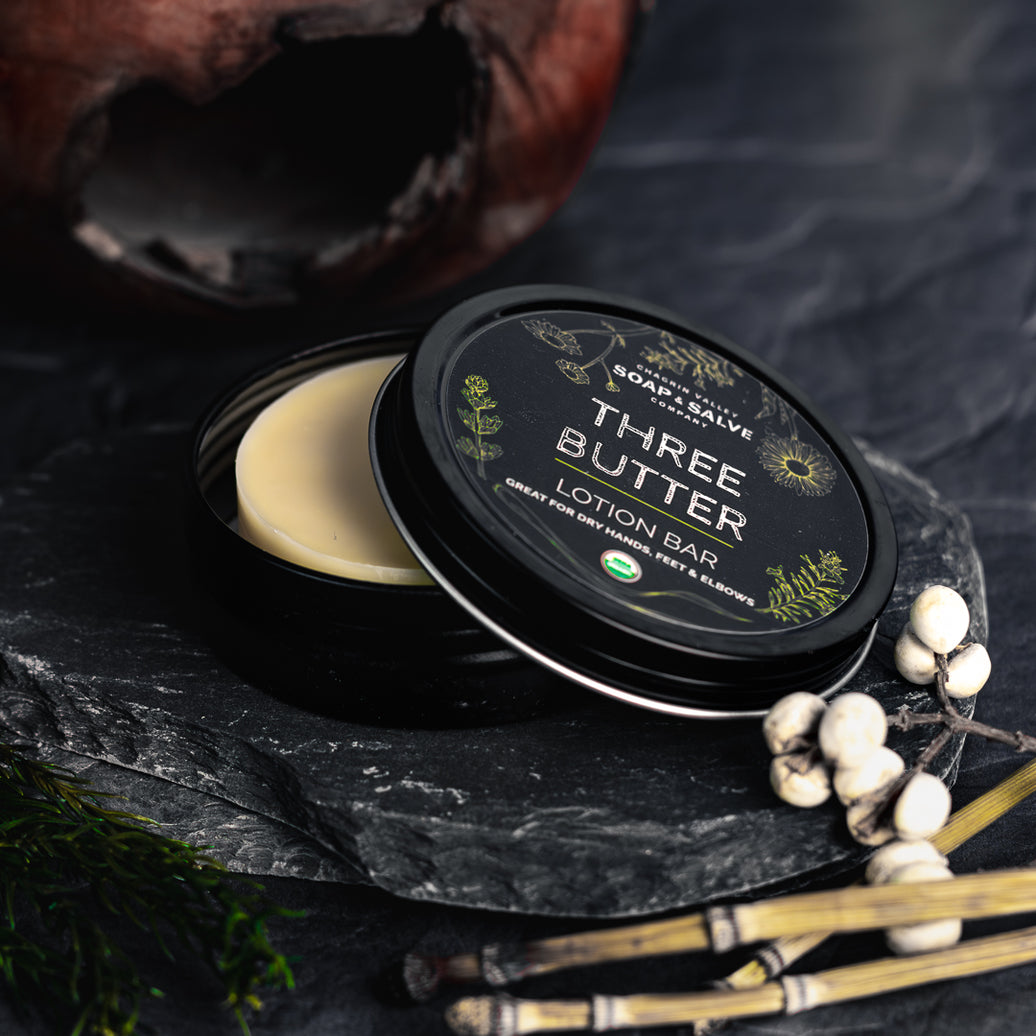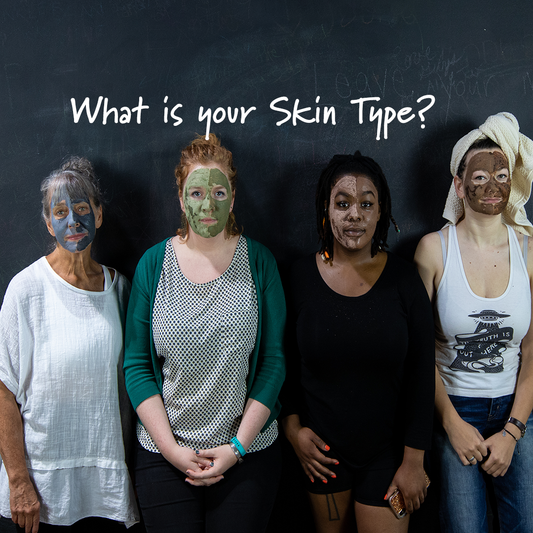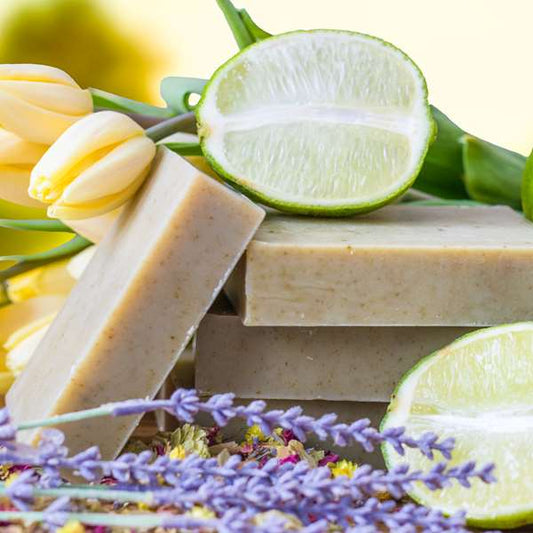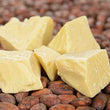
Natural Soap: Honey Butter
Natural Soap: Honey Butter
- Out Of Stock





Product Overview
Good For: Dry or Maturing Skin
It doesn’t get much better than this. An unscented soap that blends three unrefined butters, Shea, Cocoa, and Mango, plus nourishing honey, soothing aloe, and evening primrose oil into a super moisturizing skincare bar that is mild enough for sensitive skin, may help soothe the dryness and discomfort associated with irritated skin, and is an excellent natural complexion soap too!
Indulge your skin in the richness of Shea, Cocoa, and Mango Butters, which help to hydrate and nourish skin, leaving it feeling soft, smooth, and supple. These luxurious ingredients provide long-lasting moisture, support skin's natural barrier function, and enhance its overall appearance.
Honey, nature's ultimate beauty product, has been used as an emollient for centuries to soothe and calm the skin. Known for its humectant properties, honey attracts and retains moisture to help hydrate skin and contribute to a well-moisturized appearance.
Rich in natural moisture, Aloe leaves contain a gel and juice abundant in vitamins, minerals, enzymes, proteins, and polysaccharides. This natural goodness helps soothe and calm skin, hydrate and moisturize, and leave skin feeling soft and smooth. Plus, it adds a wonderful, silky and creamy texture to soap.
Evening Primrose oil is a rich source of fatty acids, including gamma-linolenic acid (GLA). This soothing oil has been traditionally used to support skin health and comfort. It is an excellent oil for dry, mature, or sensitive skin, provides long-lasting hydration, and helps to improve skin's overall appearance and radiant glow.
Experience the whipped cream-like lather with the delicious natural scent of cocoa butter as it softens skin and soothes for silky skin.
How To Use
How Should I Use Natural Soap to Clean My Face?
We believe in simple, effective cleansing for your complexion and that is accomplished with natural soap and water. The purpose of soap is to combine with oil and dirt on the body, which allows water to wash it away. The method you use to cleanse your skin, especially your face, is really personal preference. We thought we would share just a few examples. 
Hand Lathering is usually the suggested method for cleansing delicate facial skin.
- Use lukewarm water to create a creamy lather in your clean hands.
- Gently massage the lather over your face using circular motions with your fingers.
- Rinse with cool water and pat dry.
Washcloth Washers: A washcloth can help remove dead cells and invigorate your skin. A gentle massage with a soft washcloth can help keep facial skin smooth and clean.
- Rub the bar on a soft, clean, wet cloth to create a creamy lather.
- Apply to your face by a gentle massage using circular motions.
- Rinse with cool water and pat dry.

If you are using a washcloth:
- Exfoliating or scrubbing too hard may cause the skin to become red and irritated.
- Use a clean washcloth, especially if you are prone to acne. Washcloths can re-deposit dirt and grime right back onto your skin.
- Washcloths can have soft or rough fibers. You want to use soft, NOT rough fibers on your face.
Never share washcloths or other accessories and replace or clean them often.
A Few Other Pointers:
- Use warm, not hot, water to wash your face.
- Use cool water as a final rinse to close your pores.
- Avoid products made with synthetic ingredients that can irritate facial skin.
- Avoid products that contain alcohol which can cause skin to become tight and dry.
- Apply a moisturizer immediately after washing your face while skin is still damp.
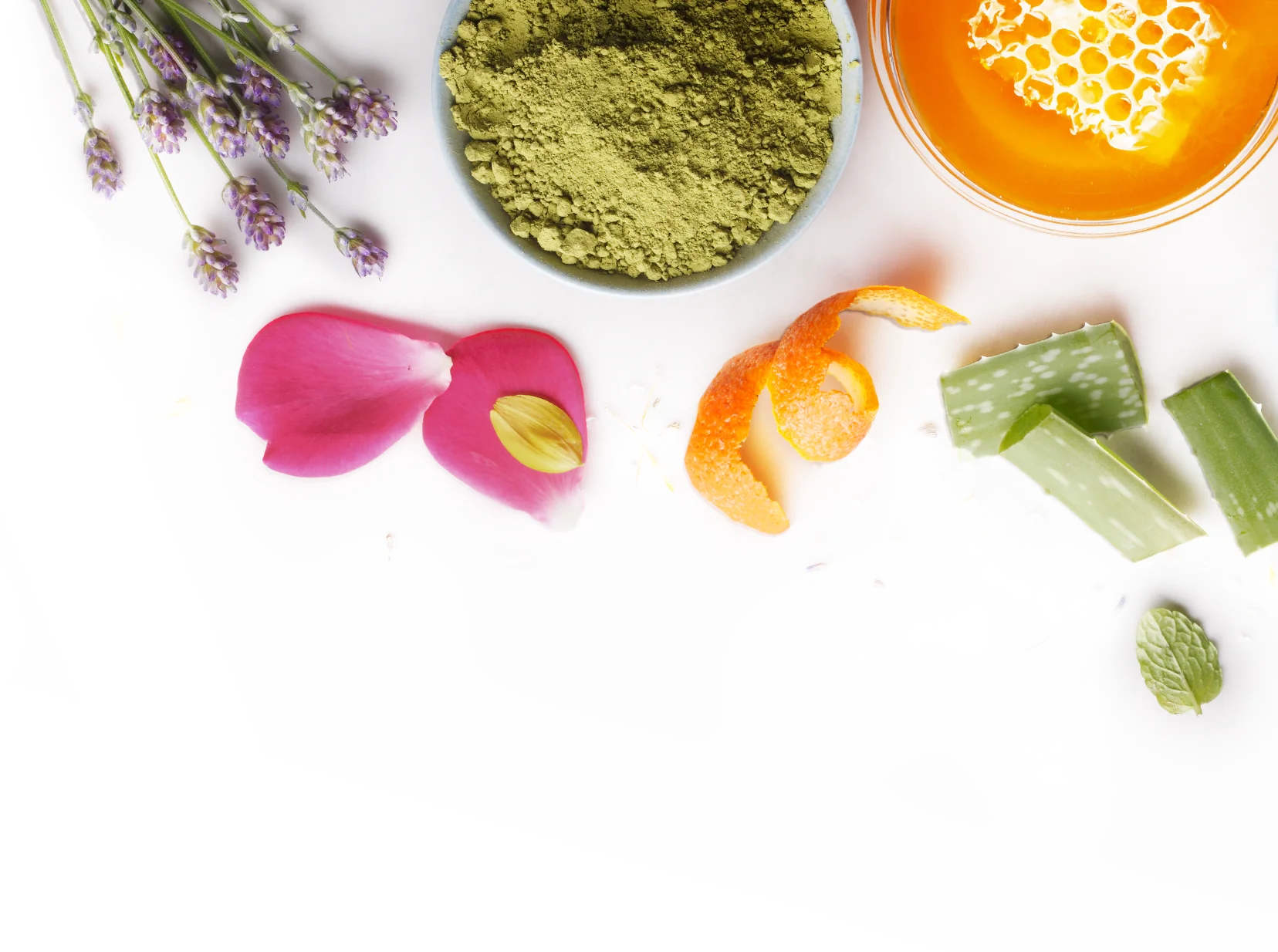
Effective, Feel Good Ingredients
The goal is simple: to Harness the Power & Simplicity of Nature® to cleanse, soothe, heal, and protect your skin and hair!
Our unique formulas rely on moisturizing oils and butters, healing botanicals, and pure essential oils. We choose every ingredient with one end-result in mind….the BEST possible natural skin care for YOU!
Featured Ingredients

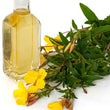
Organic Evening Primrose Oil
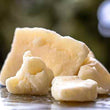
Organic Mango Butter
All Ingredients:
|
*Ingredient is Fair Trade Certified ^Used in the saponification process to turn oil into soap and glycerin. None remains in the finished product.
Made with certified organic Cocoa Butter, Shea Butter and Honey
|
Frequently Asked Questions
How To Wash Your Hands To Help Stay Healthy

Regular handwashing is one of the best ways to remove germs, avoid getting sick, and prevent the spread of germs to others.
The CDC (Centers for Disease Control and Prevention) says that for good hand hygiene all you need is plain soap and water.
Clean hands can stop germs from spreading from one person to another and throughout an entire community.
Five simple and effective steps can help reduce the spread of illness so you, your family, your friends and the general public can stay healthy.
Hand washing is a win for everyone . . . except for the germs!
CDC recommends cleaning hands in a specific way to avoid getting sick and spreading germs to others. The guidance for effective hand washing was developed based on data from a number of studies.
Wash often and follow these five steps every time you wash your hands!
1. Wet your hands with clean, warm running water and apply soap.
-
When dealing with cold and flu viruses, as you wash your hands the soap molecule burrows its way into the fatty envelope of a virus and literally pulls the virus apart.
2. Lather your hands by rubbing them together with the soap.
- Soap and friction help lift dirt, grease, and microbes—including disease-causing germs—from the skin so they can be rinsed down the drain.
- Lather the backs of your hands, between your fingers, and under your nails.
3. Scrub your hands for at least 20 seconds.
- Lathering and scrubbing hands creates friction, which helps lift dirt, grease, and microbes from skin.
- The entire hand should be scrubbed. Microbes are present on all of the wrinkly surfaces of the hand, especially under the nails.
- How long are 20 seconds? About the amount of time it takes to hum the “Happy Birthday” song from beginning to end twice.
- The ideal length of time for handwashing can depend on other factors for example, if hands are very dirty or if you are caring for someone is ill.
- Evidence suggests that washing hands for about 15-30 seconds removes more germs from hands than washing for shorter periods.
4. Rinse your hands well under clean, running water.
- If you are using a public restroom use a paper towel to turn off the faucet after hands have been rinsed.
5. Dry your hands using a clean towel or air dry them.
To date, studies have shown that there is no added health benefit for consumers (this does not include professionals in the healthcare setting) using soaps containing antibacterial ingredients compared with using plain soap.
Information is taken from the CDC.gov website
Read our blog "Simple Soap Can Help Decrease the Spread Of Viruses"
View Answer Page
12 Reasons to Use Handmade Natural Soap
After all these years in business, the most often asked question we hear remains, “Why is natural soap better?”
I have been using only natural soap on my face and body for over 20 years. It is the first product I learned to make.

My skin has become so accustomed to the benefits of these lovely bars, that everything else makes my skin itch.
Our soap bars travel with me everywhere I go. I even keep one-time-use scraps in my purse to use in public restrooms!
While I believe that many of the "reasons" listed below may apply to some natural handmade soap companies, I will focus on the one company with which I have intimate knowledge and experience--CHAGRIN VALLEY.
1. Handmade Soap is Actually Soap
Most of the soap you purchase today is a commercially manufactured chemical cocktail of ingredients. It is not natural and is not even really “soap.” They are nothing more than detergents in disguise.
Here is what the FDA has to say:
“Today there are very few true soaps on the market. Most body cleansers, both liquid and solid, are actually synthetic detergent products. Detergent cleansers are popular because they make suds easily in water and don't form gummy deposits. Some of these detergent products are actually marketed as "soap" but are not true soap according to the regulatory definition of the word.” Source
2. Natural Soap is Made With Natural Ingredients
The very best reason to use natural soap is the ingredients. A product is only as good as the ingredients used to make it.
OUR skin-nourishing ingredients are USDA Certified Organic, sustainably produced, cruelty-free, and ethically traded.
Harnessing the Power of Nature we make each soap bar unique by adding a variety of organic butters, purifying natural clays, organic herbs, seeds, grains, spices, flowers, vegetables, fruits, chocolate, and pure botanical essential oils to provide natural color, aromatherapy, texture, and gentle exfoliation.
3. Natural Soap Is NOT Made With...
- synthetic ingredients
- artificial fragrances or perfumes
- artificial colors
- detergents
- synthetic preservatives
Our soap bars contain only the ingredients that they need—no extra preservatives that liquid body washes or commercial bar "soaps" require to increase their shelf life to years, and no foam boosters to make them lather.
4. Natural Soaps Are Moisturizing

Sadly many people have the misguided perception that all bar soaps will dry your skin. The problem is that most commercial bar “soaps” are detergents and not real soap.
So why are natural soaps so moisturizing? Of course, it's the ingredients! Natural soap made of pure ingredients derived directly from nature is a rare find these days. Here are a few other reasons.
Superfatting
Superfatting is the process of adding extra fats (oils or butters) when formulating a soap recipe so there is more fat in the mixture than the lye can react with during the chemical reaction. This process creates a more hydrating bar with superior moisturizing and emollient qualities.
Our soap bars are formulated with lots of extra plant oils and butters. We superfat our bars at a higher rate than most soapmakers.
Natural Glycerin
Glycerin is not added to a natural handmade soap recipe – it is created during the natural soap making process called saponification. Once saponification is complete, the ingredients have combined and chemically changed into soap, glycerin, and a bit of water.
Glycerin, a precious and gentle emollient, is a humectant that draws moisture from the air to the skin creating a moisturizing protective layer.
Commercial soap manufacturers remove the glycerin from their soaps because excess glycerin decreases the shelf-life of soap and they can sell the glycerin or use it in products that command a higher price like the lotion.
Think about it! Commercial soap companies remove the moisturizing ingredient (the glycerin) which in turn creates a soap that dries your skin and then they use the glycerin they removed to sell you a skin-moisturizing lotion. Quite an ingenious profit-making strategy!
Thus skin-nourishing ingredients, plus superfatting and natural saponification create a soap bar full of moisturizing, natural oils, and natural glycerin.
5. Scented Natural Soap Provides Real Aromatherapy
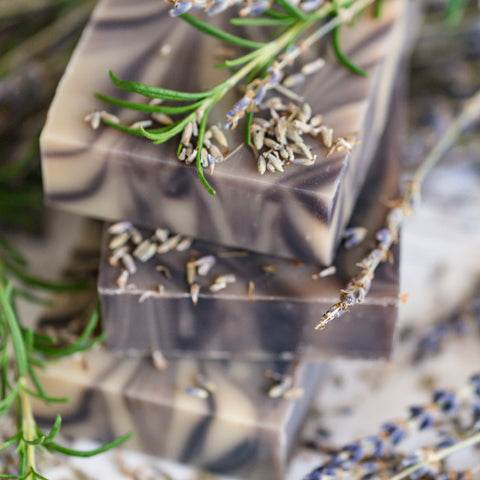
Our scented natural soaps are made with pure essential oils, not fragrance oils, and offer aromatherapeutic benefits.
Fragrance oils, whether artificially created or derived from natural components, may duplicate the smell of a flower or herb, but they do not offer the therapeutic advantages of essential oils.
Furthermore, the generic term, “fragrance” or “parfum” on a label can indicate the presence of up to 3,000 separate ingredients and the FDA does not require companies to disclose what is in a “fragrance,” because it is considered a “trade secret.”
BLOG: Why We Use Only Real Plant Essential Oils
6. Natural Soap Helps Maintain Healthy Skin
The body’s largest organ, our skin, is incredibly porous and absorbent. How we treat our skin can have a major impact on our overall health as well as the look and feel of our skin.
Everyone wants healthy skin and our skin is not a fan of synthetic chemicals. I cannot count how many times customers have told us that our natural soap has not only helped improve their skin but has improved their lives by relieving itchiness and dryness, and easing irritated skin conditions such as eczema and acne.
7. Natural Soap Provides Rich Lather Without Synthetic Foam Boosters
People absolutely love bubbly lather. The foam, bubbles, and lather we know and love from commercial liquid and bar soaps are produced by surfactants--synthetic foam boosters, lathering agents, and detergents.
A properly formulated and cured bar of natural soap needs no synthetic additives to create a lather or to clean because natural soap is a natural surfactant. So it not only makes great bubbles and lather, but it also helps clean oily dirt from your skin--naturally!
BLOG: "How Does Natural Soap Create Lather?"
8. Natural Soap is Economical
Some consumers are put off by the cost of handmade soap. You probably look at a bar of natural soap and wonder why it costs more. I mean, soap is soap, right? Both bars clean your skin, right?
While I may agree that both bars clean the skin, the similarity goes no further. Simply put, commercial soaps contain synthetic ingredients that are very cheap to produce in a lab.
If you use a liquid body wash the main ingredient is water. You pay for water. A properly cured soap bar has very little water remaining, meaning you are getting exactly what you pay for.
I believe that old saying, "You get what you pay for," rings true when comparing a handmade bar of a natural soap to a commercial brand!
BLOG: "The True Cost of Commercial Soap"
9. Natural Soap Has a Smaller Environmental Impact
It may seem odd that a product we use to keep our bodies clean is doing quite the opposite for our environment.
If you are not using a natural soap, as you take a bath or shower you coat your skin with synthetic compounds like fragrances, dyes, preservatives, and detergents. These synthetic ingredients wash down our drains into our septic fields or water treatment facilities. Now imagine the millions of people who use these soaps each day.
Also, if you use a liquid body wash, how many plastic bottles and pumps do you dispose of in a single year?
10. Natural Soaps are Unique

I make handmade natural soap. I did not invent anything new.
But what I know is that our natural soap is made in small batches by people who have a passion as well as a mission for making natural products.
For me, soapmaking is a synergy of science and art that took years to perfect. It is a labor of love. I take the time to create wholesome soap recipes that do not sacrifice beauty or scent while incorporating amazing natural and organic ingredients.
11. A Natural Soap Company Has Social Consciousness
While I am sure there are some large commercial soap companies with a social conscience, natural soapmakers tend to have the utmost respect for the earth and all its creatures.
Environmental stewardship is not a buzzword for us. It is not a talking point, not a political stance nor is it about optics!
At Chagrin Valley it is our practice to use raw materials that are sourced in an environmentally and ethically responsible manner.
- We use organic ingredients which supports organic farming
- We are Leaping Bunny Certified--Cruelty-Free
- Our palm oil and other ingredients are certified sustainable
- We buy Fair Trade whenever possible
- Our products are biodegradable and minimally packaged with recycled and recyclable materials
- Our packaging is over 99% plastic-free
- Our natural ingredients will not add synthetic chemicals to our ecosystems
Dedication to a kinder and gentler way of living is a big part of why we do what we do.
12. You Are Supporting A Small Business
 If you are holding this soap in your hand, I probably don't need to convince you that shopping small business is important. Your purchase really does make a difference.
If you are holding this soap in your hand, I probably don't need to convince you that shopping small business is important. Your purchase really does make a difference.
When you buy a handmade bar of natural soap, you are supporting a small business that truly cares about and believes in the products they make.
Small businesses are run by people - not by boards or stockholders. They are often entrepreneurs who bring a creative freshness into an otherwise regimented world.
We do it all ourselves--from start to finish--from our hands to your hands--from our family to yours! Thank you!
Before I conclude I would like to add one final reason to the question of "Why You Should Switch To Natural Soap Bars."
The simplest answer is, Why Not?
From its composition to its benefits for the skin and health, to its impact on the environment, natural soap is very different from commercial liquid “soap,” bar “soap,” or syndet bars.
View Answer Page
How Long Will A Bar of Natural Soap Last?
Short Answer
 How long a natural soap bar will last depends on:
How long a natural soap bar will last depends on:
- how many people are using it
- how often you bathe or shower
- how you use the bar
For one person showering every day, a well-drained bar should last for about one month.
Longer Answer
Natural soaps are normally softer than commercial soaps because they retain their natural glycerin (which is removed in commercial soap production) and contain no artificial hardening chemicals, synthetic waxes or free alkali.
We also superfat our soaps (add extra oils or butters) and use "softer" oils so that Chagrin Valley natural soaps are more emollient and leave skin feeling moisturized.
Different oils impart different qualities to soap. Some add lathering qualities, some moisturizing, some hardness, and so on. Compared to other natural bars, we use a larger percentage of extra moisturizing and conditioning oils in our soaps and shampoo bars. These oils produce a bar that may not be as hard as bars with less conditioning oils.
How you use the bar will also affect its lifespan. For example, do you use a washcloth, an exfoliating accessory, or only the bar? Although exfoliating loofahs and sponges are great they will use up the soap much faster than a washcloth or the "only the bar" purists.
Our Natural Soap Will Last A Long Time With Proper Care
- Don't let your soap sit in water
- Store soap on a well-drained soap dish
- Allow soap plenty of fresh air to dry between uses
- Never place soap where shower water can continuously hit it
- If your bar ever gets waterlogged and becomes gooey, simply set it on a draining soap dish or stand it on its edge for a few days and let it dry out thoroughly
Cute Story: A customer called to say she loved our soaps but could not buy them anymore because they did not last as long as other soaps. A week later she called to place an order and apologize. Her husband, who would NEVER use her natural soaps before, fell in love with her new Juniper soap . . . and he showered twice a day!
To maximize the life of your soap, keep it in a well-drained soap dish so it can dry between uses.
We sell a handcrafted solid white oak soap dish. The deep ridges are perfect for keeping your all natural handcrafted soap dry between uses. White Oak is the wood used in shipbuilding.
A tip passed on by one of our customers whose kids always leave the soap in a water puddle: cut the large bars in halves. Then alternate the halves, allowing a longer drying time between uses.
View Answer Page
Don't I need to use antibacterial soap to protect my family from germs?
The Short Answer
NO! Adding antibacterial chemicals to soap does not keep your family safe from germs.
I understand why folks (especially those with children) are choosing products labeled “Antibacterial,” hoping to keep their family safe in the war against germs.
According to Janet Woodcock, M.D., director of the FDA’s Center for Drug Evaluation and Research (CDER).
"Consumers may think antibacterial washes are more effective at preventing the spread of germs, but we have no scientific evidence that they are any better than plain soap and water.
In fact, some data suggests that antibacterial ingredients may do more harm than good over the long-term.”
Simply washing your hands with old-fashioned natural soap and water rids your skin of most fungi, bacteria, and viruses. Soap does not kill germs, it surrounds them and carries them away.
The Long Answer
Please read our blog: Antibacterials: More Harm Than Good!
View Answer Page
Can I Use Your Natural Skincare Products While Pregnant or Nursing?
 We often receive questions as to whether our soaps, shampoos, and other natural products are safe to use during pregnancy.
We often receive questions as to whether our soaps, shampoos, and other natural products are safe to use during pregnancy.
We recommend that expectant and nursing mothers check with their midwife or physician before changing a skincare routine with our organic products, or any other line of products.
Read the label on a bar of commercial soap. Read the label on your jar of moisturizer.
Now read the ingredients in a Chagrin Valley product.
We use quality natural and USDA Certified Organic ingredients. No synthetic additives, colorants, fragrances, preservatives, or chemical derivatives are used.
There is nothing in our all-natural basic soap or other products that could cause a problem in pregnancy.
Topically applying the herbs present in many of our soaps is also not a problem. Your skin will absorb much less herb from the soap than if you would sprinkle them on your food.
Essential Oils
The issue that seems to be of most concern is the use of essential oils during pregnancy.
There is a lot of confusing, ambiguous, and inaccurate information concerning the use of essential oils in pregnancy.
The question of safety and safety testing has a lot to do with several factors.
-
The type and composition of the specific essential oil. Essential oils differ greatly in strength and composition.
-
The quality of the essential oil. Many "cheap essential oils" are not pure and maybe cut with synthetic chemicals.
-
The actual “dose” of herb/essential oils. Most of the clinical research on essential oil safety is based on information for internal (actually ingesting) large doses of herbs, essential oils, or herbal "medicines." Obviously there have been no tests done on pregnant women.
- How the essential oil is being used. The concentration of essential oils that are absorbed through inhalation, as in aromatherapy, and massage is much lower than if you were actually ingesting the oil.
But also, aromatherapy and massage therapy use much higher concentrations of essential oils than you find in soap or even in eating the herb. With aromatherapy, you are inhaling the high concentrations which get absorbed via the lungs and in massage therapy, the essential oils remain on your skin and are absorbed.
Our scented soaps are gently scented with essential oils, but the choice is between you and your health care professional. The most critical time is the first trimester.
Just about every one of our products, like lip balms, whipped butters, soaps, shampoos, and deodorants has a "no added scent" version.
When there is a growing baby to consider, if you are at all uncertain as to the safety of an essential-oil containing product, or any ingredient, please consult your doctor, midwife, or health care professional!
When it comes to safety during pregnancy it is understandable that many massage therapists and aromatherapists decide to err on the side of caution in recommending the avoidance of certain essential oils.
Some Herbalists and Aromatherapist believe that essential oils that are normally safe to use, are safe during pregnancy, while others will recommend avoiding all essential oils during pregnancy.
Some essential oils that are normally quite safe have hormone-like effects and some even stimulate uterine muscles, both of which would be contraindicated during pregnancy.
Please do not ask us if one of our products is safe to use during pregnancy--we will simply refer you to this page.
We do not provide a list of essential oils considered safe during pregnancy because the information available is very contradictory. One aromatherapy source will list an essential oil as problematic while another one states it is fine.
The information is also changing constantly. Please do your own research and consult your doctor, midwife, or health care professional for the most up-to-date information.
Sensitive Skin Can Strike During Pregnancy
Even if you have never had sensitive skin in the past, you may notice that a product you have been using for several years now irritates your skin.
The stretching belly is often the most sensitive spot. Other potential problem areas include the hips, thighs, and bottom where the skin may become dry and flaky.
Although the exact cause is not known, raging hormones do make you more sensitive to a wide range of things, and also your skin is thinning and stretching as you, and your baby, grow.
These changes can behave in unpredictable ways. For example, if you have eczema you may suffer from major flare-ups or complete remission during pregnancy.
Keep your body well moisturized and avoid products that contain synthetic additives, colorants, fragrances, or preservatives. Any of these can exacerbate sensitive skin problems.
Before trying a new product, you can always do a patch test to test for sensitivity.
And again, we recommend that expectant and nursing mothers check with their midwife or physician before changing a skincare routine with our products, or any other line of products.
Pregnancy & Children: We do not provide information on the safety of essential oils during Pregnancy or for use in Children because the available information is very ambiguous and often contradictory. If you’re interested in using essential oils during pregnancy or with young children please do your own research and consult your doctor, midwife, or health care professional before use.
View Answer Page
Can I Use Your Products on my Baby or Young Children?

We often receive questions as to whether our soaps, shampoos, and other items are safe to use on young children.
A baby’s skin, so thin and delicate, is no place for harmful synthetic chemicals.
Sadly, even some of the most trusted baby brands add nasty chemicals to their products.
Read the label on a bar of commercial baby soap or shampoo. Read the label on a bottle of commercial baby oil. Now read the ingredients in Chagrin Valley products.
We recommend starting with our Milk & Honey Baby Soap. We also recommend our two Castile soaps and Carrot & Honey Soap. They are unscented and, as with all of our products, contain no artificial ingredients!
My grandkids use our Milk & Honey bar as a baby shampoo--just keep the soap away from their eyes.
When you think your child is ready, try some new soaps.
As with all new products, it is best to do a skin patch test prior to full usage to test for any skin allergies or sensitivities. If you have any questions or concerns always check with your doctor or health care professional.
It is best to add only one new soap or product at a time and use it for a while before switching to a new soap.
Essential Oils & Children: We do not provide information on the safety of essential oils for use in Children because the available information is very ambiguous and often contradictory. If you are interested in using essential oils with young children please consult your health care professional before use.
Please do not ask us to diagnose your child's skin problems, we are not health care professionals. Our recommendations are based on what our customers have shared.
Click Here to visit our page of Organic Baby products!
View Answer Page
Why Choose Chagrin Valley Natural Soaps
Aren't all handmade natural soaps the same? . . .
The answer is NO!
 Saying a soap is "handmade" says nothing about quality of the ingredients or the knowledge and skill of the soapmaker!
Saying a soap is "handmade" says nothing about quality of the ingredients or the knowledge and skill of the soapmaker!
Chagrin Valley is not just another soap and skincare company. We are committed to healthy skin, healthy people and a healthy planet.
We are a USDA Certified Organic Company specializing in luxurious, organic, handmade natural soaps and shampoo bars rich in natural glycerin for healthier skin and hair.
It's all about the ingredients! Inspired by our love of nature, we use organic herbs, seeds, flowers, vegetables, fragrant spices, fruits, pure essential oils and purifying clays for their exceptional skincare benefits and to provide natural color, aromatherapy, texture, or gentle exfoliation. Nothing artificial, nothing synthetic, no GMO’s, just natural wholesome ingredients.
Chagrin Valley's Natural Soap & Shampoo Bars Are...
- all natural
- made with USDA Certified Organic ingredients
- handcrafted in small batches using the old-fashioned Cold Process Method
- made with sustainable and fair trade ingredients
- certified cruelty-free
- free of detergents
- free of synthetic fragrances
- free of synthetic colors
- free of artificial preservatives
- free of artificial foam boosters
- free of alcohol and petroleum products
- free of synthetic additives
- free of GMOs
- biodegradable
- mild and nourishing
- rich in natural glycerin
- magnificent long-lasting lather
- cured for 8 to 10 weeks
Our soap making process uses only natural and organic ingredients. Why add artificial ingredients to a handmade product?

"Are All Handmade Soaps The Same?"
"12 Reasons to Use Natural Soap"
View Answer Page
Is Your Palm Oil From Plantations That Protect Our Rainforests?
We often receive emails from concerned customers that have read about the devastating effects that palm plantations can have on tropical forests.
At Chagrin Valley Soap we treasure our planet and its inhabitants. We know that although we play a very small part, we must always make choices that are ecologically and socially responsible.
As the global demand for palm oil continues to increase we want to be part of the global initiative that changes how that palm oil is grown.
Our Palm Oil is grown and manufactured according to standards for sustainable practices set forth by Palm Done Right.
Certified Sustainable
Certified sustainable by RSPO (The Roundtable on Sustainable Palm Oil) and Palm Done Right

Our USDA organic palm oil variety carries RSPO Certification, otherwise known as Roundtable on Sustainable Palm Oil, guaranteeing the sustainability and traceability of the palm oil production throughout the supply chain.
It has RSPO-IP (Identity Preserved) certification which is one of four certification levels offered by the RSPO and carries the highest and strongest level of sustainable guarantee with traceability of each lot of palm oil back to the field of origin. With Identify Preserved sustainable palm oil, the entire batch of palm oil is from a single identifiable certified source and kept separate from all non-certified batches.

Palm Done Right presents the first fully integrated, 100 percent organic supply chain in the palm oil industry. Palm Done Right requires a fair labor certification, organic certification, Non-GMO Project Verification, and has the highest level of certification — Identity Preserved — offered by the Roundtable for Sustainable Palm Oil (RSPO).
As the global demand for palm oil continues to increase, we believe that if both manufacturers and consumers demand Certified Sustainable palm oil, producers will grow Certified Sustainable palm oil. That is the only way to really protect our rainforests.
If there is no demand for sustainable palm oil, growers will continue their cheaper unsustainable practices, because no one is paying them for a sustainable product. (If you build it, they will come!)
Please read our blog, "Will A Palm Oil Boycott Really Help?"
View Answer Page
